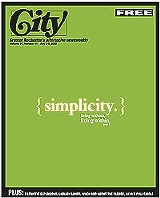[
{
"name": "500x250 Ad",
"insertPoint": "5",
"component": "15667920",
"parentWrapperClass": "",
"requiredCountToDisplay": "1"
}
]
The back lawn was knee-high before the Fourth of July, and the garden hose, which I’d snaked out along the grass weeks earlier, was as good as buried. I went down on all fours, searching with my fingers through clumps of greenery --- darkery, considering it was 10 p.m. A fool’s errand. But then I started thinking in the quiet, and enjoying the unaccustomed touch of cool ground. How’d I let things get away from me? Life did it, or I let life do it. Work, bill-paying, hurried entertainment, everything had put my little patch of earth behind a Great Wall. Forget the invisible hose, where was the ladder?
OK, the mood wasn’t accidental. My mind was primed by interviews with local people who are part of a movement --- or at least a social drift --- called Voluntary Simplicity.
These people, like thousands across North America, have made a conscious decision to pare down complicated lives, or take on entirely new ones. They’d given up jobs and pursued more hands-on work aimed at reconnecting with the most basic (it must be said: conservative, as in “conservation”) values and routines.
Some of these people haven’t yet made, maybe never will want to make, a big transition from an old life to a new one. They’re happy keeping their careers and outwardly ordinary lives chugging along, while adjusting things around the edges. In this context, for example, a decision to get serious about gardening, as opposed to harvesting the supermarket produce counter, can be significant.
The interviewees --- like the movement as a whole --- lived with various contradictions. They even solved a lot of them. But either way, I imagined them in some figurative undergrowth, asking: Where’s the line between an unencumbered life and an involuntary condition of poverty? How do real poor people react when they hear about relatively privileged folks walking this walk? Has the issue of class again been locked in the closet of American radical individualism? Will any of this make a difference?
The Earth Native Network, a new local group formed to explore Voluntary Simplicity, is asking such things of itself.
The group is still small, around a dozen members, says Mary Gleason, a Network leader and native Rochesterian. (Fifth generation Rochesterian, she says; her grandfather was George Eastman’s personal organist). Right now, Gleason says, the members are discussing “deep ecology,” aided by study materials from the group’s de facto parent organization, the Oregon-based Northwest Earth Institute. The Institute defines deep ecology with a three-part principle: “Human beings are one of many species, everything is interconnected, and sustainability should replace economic growth as our long-term goal.” (This form of deep ecology is not to be confused with the philosophy promoted years ago by macho practitioners of “monkeywrenching” and “ecotage.”)
But to understand Gleason’s commitment to simplicity, you have to look at her personal story, her way of life, her new ambitions. Until around a year ago, Gleason was a public librarian. She left after 18 years, she says, “in order to create space that had more meaning for my life.”
So how does she survive now? “I’m able to live on very little,” she says, “and cleaning houses provides my living expenses.” She adds she looks very carefully at every purchase. That includes health insurance --- she’s got a bare-bones policy, she says.
Gleason harbors no illusions, or pretensions, that she’s poor. “Involuntary poverty,” she says, is “very debilitating to the human spirit.”
How does Gleason fill up her time? You might say her days are a search for balance. She says she pursues “right livelihood” in her paid work, as well as in the practice of Vipassana, an Indian technique that she glosses as “mindfulness meditation.” She also takes part in an urban-rural work-sharing project called Genesee Valley Organic Community Supported Agriculture, which revolves around Wayne County’s Peacework Farm and Rochester’s Abundance Cooperative Market.
Otherwise, Gleason is out there organizing. With others in the Earth Native Network, she brings the message to church groups, schools, and other venues.
Last academic year, Gleason says, she taught a Voluntary Simplicity course at the University of Rochester, and she’s open to doing more of this. But she sounds most enthusiastic about a project that local Voluntary Simplicity enthusiasts brainstormed at a recent retreat: the creation of a local “Center for Sustainable Living.” The plan is still vague, but the Center could be built somewhere in Ontario County.
The idea for such a center, says Gleason, came from a two-week training she and other locals attended at Genesis Farm in Blairstown, New Jersey. Founded and run by a Roman Catholic community of Dominican Sisters, Genesis Farm hosts workshops like these to further its mission --- strengthening “connections between the health and sustainability of the earth itself and the health of human communities as experienced in particular regions.”
Gleason leads an active life. But does Voluntary Simplicity come down to what a practitioner avoids doing? Is it a particular diet or spiritual practice? Is it a retreat from modernity and technology? Is it, in traditional terms, a lifestyle of renunciation?
These questions run through the movement’s literature, perhaps starting with what some adherents call their “bible,” Duane Elgin’s modest book, Voluntary Simplicity: Toward a Way of Life That Is Outwardly Simple, Inwardly Rich (1981, updated 1993). The term “voluntary simplicity” is yet older than this, however; Elgin says he found it in a 1936 book by Richard Gregg, who’d studied with Mohandas Gandhi.
In his book, Elgin, a social scientist who formerly worked at the Stanford Research Institute, defines his subject as “harmonious and purposeful living” --- but he also takes pains to address “misconceptions about the simple life.”
So what is it that Voluntary Simplicity is not? According to Elgin:
• It’s not “impoverished living.” The point’s been made above. But significantly, Elgin, a farmer’s son, says he learned this fact growing up, working in the fields alongside migrant crews.
• It’s not “turning away from progress.” Elgin, a fan of “appropriate technology” as defined by Small is Beautiful author E.F. Schumacher, speaks of “a balanced approach… that harmonizes both inner and outer development.” Indeed, Voluntary Simplicity and new technologies seem made for each other. Many advocates of simple living --- including some with a strong profit motive --- make extensive use of the Internet and e-communications. And some online resources are comprehensive and very useful, like “Seeds of Simplicity,” sponsored by Cornell University’s Center for Religion, Ethics, and Social Policy. (See www.seedsofsimplicity.org.)
• Voluntary Simplicity is not your parents’ or grandparents’ back-to-the-land movement, though there’s no natural conflict between the two. Elgin makes the point: “The romanticized version of rural living,” he says, “does not fit the modern reality, as a majority of persons choosing a life of conscious simplicity do not live in the backwoods or rural settings; they live in cities and suburbs.” (Indeed, living in more densely populated areas helps solve one of the simplifier’s key concerns: affordable, accessible, and ecological transportation.) Elgin notes that Henry David Thoreau’s famed cabin at Walden Pond was only a stone’s throw from the highway, and that Thoreau, no hermit, spent a lot of time in town.
• The movement is not about “denial of beauty,” says Elgin. He retrieves the aesthetic from modernist theories like Frank Lloyd Wright’s organic simplicity --- “eliminate the superfluous,” blend with the natural environment, and “liberate the aesthetic sense by freeing things from artificial surroundings.”
Elgin spends time rooting the movement in history and social affairs, as well.
Voluntary Simplicity, he says, has grown out of the Golden Mean (middle path) and Golden Rule of antiquity; the teachings of early Buddhism, Hinduism, and Taoism; and the example of the Quakers.
He thanks the Puritans for bequeathing us the saying, “Use it up, wear it out, make do, or do without.” And he approvingly quotes the Transcendentalist Ralph Waldo Emerson --- that a person “is rich in proportion to the number of things which he can afford to let alone.”
Still, the ecological aspect --- understood in the broadest terms --- may be the dominant one here.
Elgin compares the “Industrial-Era View” and “Ecological-Era View” side-by-side. The first view, he says, has caused a long laundry list of planetary ills, including global warming, the death of tropical rainforests, and widening economic inequality. The second view, he says, demands that we counter the ills by living peacefully and efficiently. And though he advances no hardened political program, Elgin argues for a global redistribution of wealth.
This comprehensive vision is the sort of thing that brought activist Hank Stone, a businessperson who lives in Ionia, into the local movement.
Stone, an environmentalist who moonlights with the local Peace Network and publishes its newsletter, says he and some others “interested in the survival of the planet” began meeting two years ago. The brainstorming, he says, led to the more formal structure of the Earth Native Network.
But what keeps Stone in the loop is not a particular project or event. He says the big factor for him is, simply, the people involved. He mentions “a higher quality of company” than he expected to find. The process suits him, too. “We don’t have a requirement to come to consensus on anything,” he says. The attraction, he says, is the “excellent opportunity to discuss ideas.”
The simple-living demographic is what you’d expect. Duane Elgin himself did a study in the late 1970s, when the movement was already well established, and well publicized in journals like Co-Evolution Quarterly. The findings are given again in the 1993 edition of Elgin’s book.
Using a base of more than 600 respondents, Elgin found some diversity in occupation (blue- and pink- as well as white-collar) and geographical distribution (from 42 states, plus Canada, Australia, and Europe). But he found that “most grew up in relatively affluent homes” and “nearly all respondents were white.”
Given all that, there are real differences in the way individual Simplifiers confront the world.
Some are like 19th Ward resident Paul Arnold, a 40-something Earth Native Network participant who left a longtime job at RIT two years ago, helped by a small inheritance and a tendency to cut expenses.
“There were things I wanted to do but didn’t have time for,” Arnold says. “I spend a lot of time keeping healthy… I do yoga and classes at the gym.” On the other side of the ledger, he says he also does a lot of volunteering with 19th Ward neighborhood groups.
“I grew up in a family that stressed the Protestant work ethic,” says Arnold. He adds he may go back to work somewhere, part-time. He has no children or other dependents, and he owns his home free and clear. (When he finally paid off his mortgage, friends suggested he could move to Pittsford. “I said, Why?”)
But Dori Green, head of the Ash Grove Community Farm and Center for Sustainable Living near Corning, New York, is in another boat.
Green, a part-time tech writer and self-described “Rochester refugee,” has spent 11 years at Ash Grove. She adds she’s been a “35-year practitioner of Voluntary Simplicity.” But she describes a web of complexity, too.
With other Community members, Green tends the 20-acre farm’s extensive organic gardens and otherwise maintains the land. Community members, says Green, come mostly from the Corning-Elmira area, but also from Rochester, Syracuse, and many points more distant. The farmhouse is a living and meeting space, she says, and it contains a 5,000-volume library on all aspects of sustainable living. (You can take a virtual tour and get membership information at www.ic.org/agrove.)
But whatever it is, it’s not an idyll.
Right now, says Green, there’s in fact a threat of foreclosure.
“I’m not convinced,” she says, “that anybody can make a living from an organic farm, at least on the small scale.” Still, she’s plugged into networks that are making a go of it: For example, she’s a past board member of NOFA, the Northeast Organic Farming Association, and she’s got region-wide connections with Community Supported Agriculture groups, including an educational CSA project called the Robin Van Eyn Center.
Green hopes people will come to Ash Grove Farm --- and join. “I’m looking for progressive-minded people,” she says. The rent, she says, is easy at $100 to $300 a month.
But Green’s story is like anti-recruitment in some ways.
A lot of people who are practicing Voluntary Simplicity, she says, have seen “the handwriting on the wall and want to learn how to survive in hard times.” You don’t have to have a New Age orientation to be involved, she says. (Actually, she disdains people who just “sit on a prayer cushion” while practical help is needed. She says she’s looking for “the people who can wade out into the crud.”)
“People have the idea that anything associated with Voluntary Simplicity will be free!” Green exclaims. “Not when you have a $600 or $700 mortgage!” And there, she says, lies “the heart of the difference between Voluntary Simplicity and things that masquerade as it.”
Yes, some of Green’s comments seem pretty discouraging. But she’s sticking by her lifelong philosophy.
The Simplifier’s life, she says, is meant “to define and grow community, and put the ‘culture’ back with ‘agri.’” She cites a host of problems that Voluntary Simplicity, at least in its strongest concentrate, can address --- things like soil depletion and pesticide contamination, which affect urban as well as rural America.
“We don’t have to have $25-an-hour jobs to survive,” says Green. She adds the necessary correlative: The economy as it exists, she says, runs on (or over) “an entire army of minimum-wage slaves.”
Green borrows a redefinition. Real profit is “living with dignity in beautiful surroundings,” she says. “Everyone has that right.”
Speaking of...
-

The monarchs of mushroom forest
Jan 13, 2016 -

Nuclear options
Jul 31, 2013 -

On the money
Sep 7, 2005 - More »
Latest in Featured story
More by Jack Bradigan Spula
-

The state of Main
Apr 14, 2004 -
School improvement: the price is wrought
Apr 7, 2004 -
Hour of power
Mar 31, 2004 - More »





